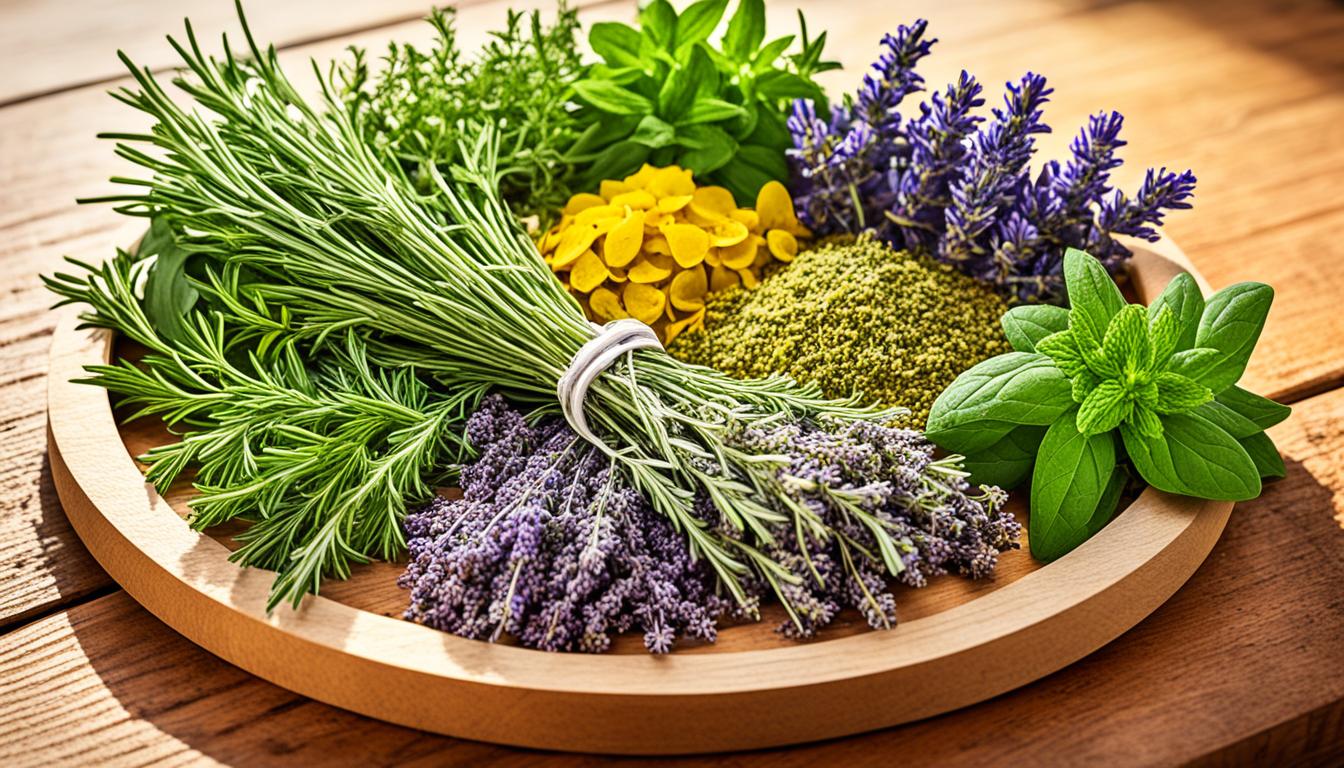Are you tired of relying on synthetic medications for every health issue? Are you seeking a more natural and holistic approach to your well-being? Look no further than herbalism. In recent years, herbal remedies and plant-based remedies have gained immense popularity for their therapeutic benefits and healing properties.
But what exactly is herbalism, and how can it improve your overall health? In this article, we will explore the world of herbal medicine and uncover the secrets of traditional herbalism. From natural healing to holistic health, we’ll provide you with valuable insights and practical tips for incorporating medicinal plants into your daily routine.
Discover the power of botanical medicine and learn how to harness the potential of herbs for a healthier, more vibrant life. Whether you’re looking for remedies to common health issues, ways to enhance your beauty routine, or tips on cooking and baking with herbs, this article has got you covered. Get ready to embark on a journey towards natural wellness with the guidance of herbalism.
Home Remedies with Herbs
Herbs are a wonderful natural solution for a variety of common health issues. They can be easily incorporated into your daily routine to provide relief and support for your overall well-being. Whether it’s a soothing herbal infusion, a concentrated tincture, or a healing salve, herbal remedies offer a gentle and effective alternative to conventional medicine.
Infusions
Infusions are simple herbal preparations made by steeping dried herbs in hot water. They are a popular way to enjoy the medicinal properties of herbs through a tasty and comforting beverage. Let’s explore a few common infusions and their health benefits:
- Chamomile: A calming herb known for its ability to promote relaxation and improve sleep quality.
- Peppermint: A soothing herb that aids in digestion, alleviating symptoms such as bloating and indigestion.
- Calendula: A healing herb with anti-inflammatory properties, often used topically to soothe irritated skin.
- Lavender: A fragrant herb that can help reduce stress and anxiety, promoting a sense of calm and relaxation.
Tinctures
Tinctures are concentrated liquid extracts made by soaking herbs in alcohol or vinegar. They are potent and have a longer shelf life compared to infusions. Here are a few examples of tinctures and their uses:
- Chamomile: A gentle herb that can be used to ease tension headaches and promote relaxation.
- Peppermint: Known for its soothing effects on the digestive system, peppermint tincture can help relieve stomach discomfort and nausea.
- Calendula: An excellent herb for skin health, calendula tincture can be applied topically to promote the healing of minor cuts, scrapes, and burns.
- Lavender: A calming herb that can be used in a tincture form to ease anxiety, stress, and promote better sleep.
Salves and Balms
Salves and balms are herbal preparations made by combining infused oils with beeswax or cocoa butter. They are commonly used topically to treat various skin conditions and provide relief for muscle aches and pains. Here are some examples:
- Chamomile Salve: Soothes skin irritations and promotes healing for minor cuts and burns.
- Peppermint Balm: Provides cooling relief for headaches and muscle tension when applied to the temples or affected areas.
- Calendula Salve: Known for its wound-healing properties, calendula salve can help soothe and protect minor cuts, rashes, and dry skin.
- Lavender Balm: Helps to calm and nourish the skin, making it a great choice for dry, chapped lips or as a relaxing massage balm.
Using herbal remedies at home is an empowering way to take care of your health naturally. However, it’s essential to do thorough research, consult trusted sources, and seek professional guidance when needed. Every herb and individual may react differently, and it’s important to understand how to use them safely and effectively.
Now that we’ve explored the benefits of herbal remedies and how to incorporate them into your daily routine, let’s delve into the world of herbal beauty products in the next section.
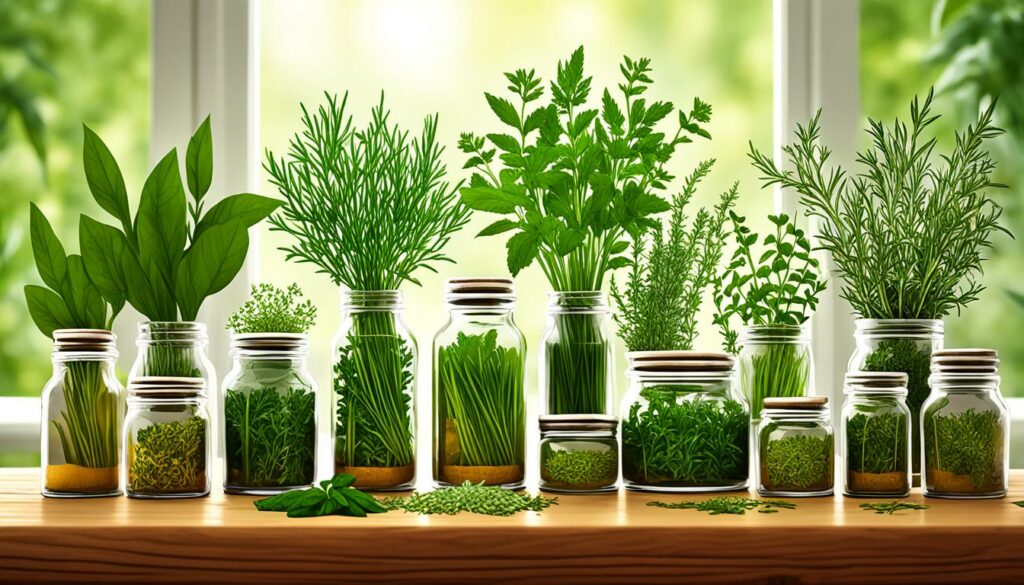
Beauty Products with Herbs
Herbs have long been recognized for their nourishing and rejuvenating properties, making them an excellent choice for incorporating into beauty products. From facial steams to face masks to herbal shampoos and conditioners, there are numerous ways to harness the power of herbs for glowing skin and luscious hair.
Facial Steams for Hydrated Skin
One popular way to use herbs in your beauty routine is through facial steams. By combining herbs like lavender, rose, or chamomile with hot water, you can create a soothing and hydrating steam that opens up your pores and leaves your skin feeling refreshed. This natural method helps to cleanse the skin and promote a healthy glow.
Nourishing Face Masks
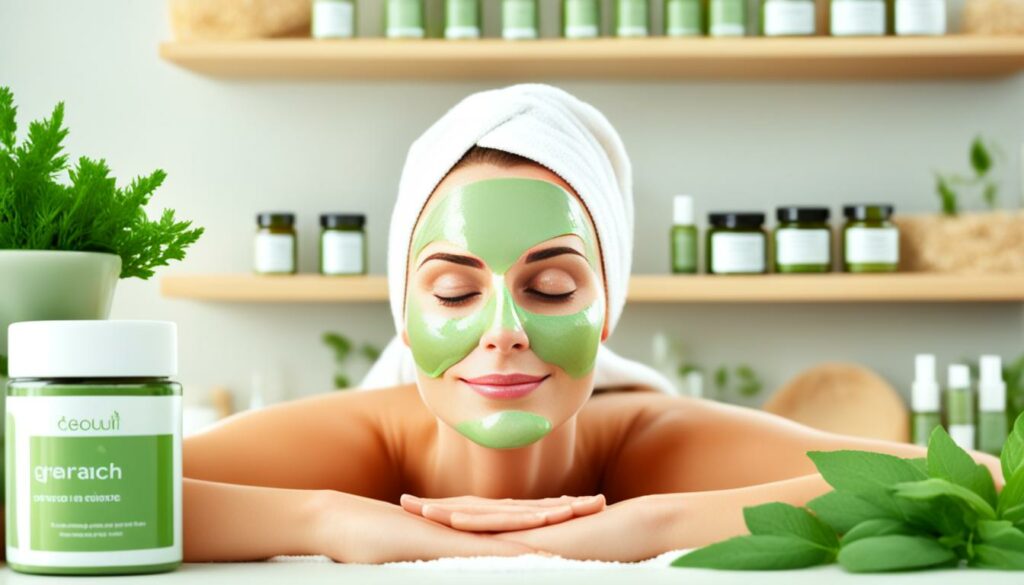
Face masks made with herbs are another great option for achieving radiant and hydrated skin. Ingredients like turmeric and honey can brighten the complexion and provide antioxidant benefits, while aloe vera and avocado offer deep hydration and nourishment. These natural face masks are a luxurious treat for your skin.
Herbal Shampoos and Conditioners for Healthy Hair
When it comes to hair care, herbal shampoos and conditioners can work wonders. Products infused with herbs like rosemary and peppermint or chamomile and lavender are known for their ability to promote healthy hair growth, soothe the scalp, and provide shine and softness. Using herbal hair care products can elevate your hair care routine to a whole new level.
Benefits of Beauty Products with Herbs
| Product | Benefits |
|---|---|
| Facial steams | – Opens up pores and hydrates the skin – Cleanses the skin and promotes a healthy glow |
| Face masks | – Brightens the complexion – Provides deep hydration and nourishment – Offers antioxidant benefits |
| Herbal shampoos and conditioners | – Promotes healthy hair growth – Soothes the scalp – Provides shine and softness |
By incorporating herbal beauty products into your skincare and haircare routines, you can harness the natural benefits of herbs for a radiant and healthy appearance.
Cooking and Baking with Herbs
Herbs are not only great for their medicinal properties but can also enhance the flavor and nutrition of your meals. Whether you prefer fresh or dried herbs, incorporating them into your cooking and baking can add a delightful twist to your dishes. Experimenting with different combinations of herbs, such as basil, oregano, thyme, and rosemary, can elevate your culinary creations to new heights.
Flavorful Combinations
Combining different herbs can create unique flavor profiles that complement various cuisines. For example, a blend of basil and oregano is perfect for Italian dishes like pasta sauces and pizzas, while a combination of thyme and rosemary pairs well with roasted meats and vegetables. Don’t be afraid to get creative and mix and match herbs to discover your favorite flavor combinations.
Timing is Key
When cooking with herbs, it’s important to understand the timing of adding them to your dishes. Dried herbs should be added at the beginning of the cooking process to allow their flavors to develop and infuse into the dish. On the other hand, fresh herbs should be added towards the end to preserve their delicate flavor and aroma. This will ensure that you get the most out of your herbs in terms of taste and fragrance.
A Dash of Strong Herbs
Some herbs have a strong flavor, so it’s best to start with a small amount and adjust to your taste. For example, rosemary can be quite potent, so adding just a few sprigs can provide a powerful burst of flavor. Gradually increase the amount if desired, keeping in mind that a little goes a long way when it comes to strong herbs.
Nutritional Boost
In addition to their flavor-enhancing properties, herbs also offer nutritional benefits. They are packed with antioxidants, vitamins, and minerals that can support your overall health. For example, basil is rich in vitamin K, oregano is a good source of antioxidants, thyme contains vitamin C, and rosemary is known for its anti-inflammatory properties. By incorporating herbs into your cooking, you can add extra nutrition to your meals.
| Herb | Nutritional Benefits |
|---|---|
| Basil | Rich in vitamin K |
| Oregano | High in antioxidants |
| Thyme | Contains vitamin C |
| Rosemary | Anti-inflammatory properties |
So the next time you’re in the kitchen, don’t forget to reach for those fresh or dried herbs to take your cooking and baking to the next level. Experiment, explore and savor the incredible flavors and nutritional benefits they bring to your culinary creations.
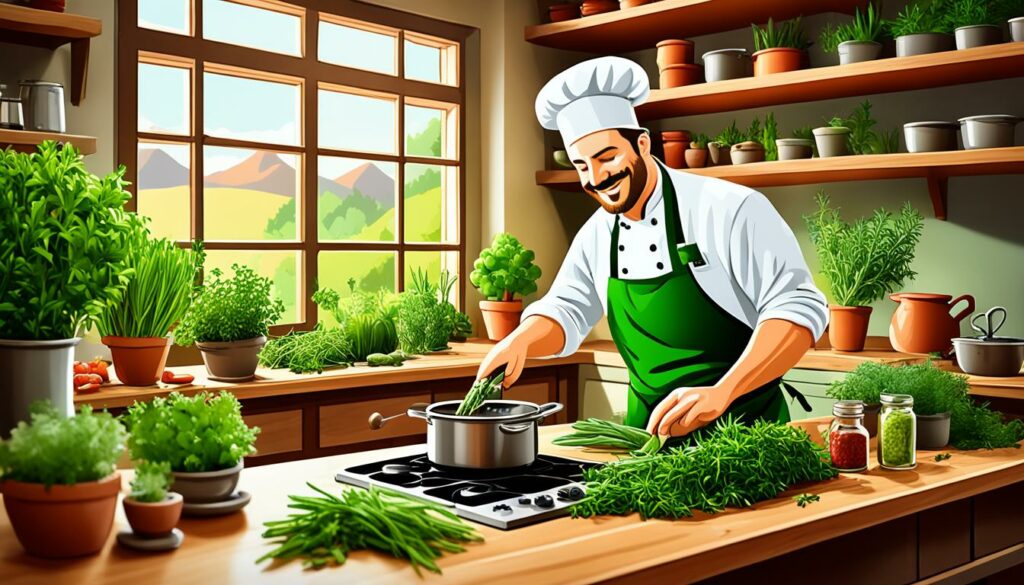
Incorporating Herbs for Wellness
Herbs play a crucial role in promoting overall wellness and addressing specific health issues. These natural remedies offer a multitude of benefits, including boosting immunity, promoting restful sleep, reducing stress, and providing essential antioxidants for the body. Incorporating herbs into your daily routine can help improve your general well-being and enhance your quality of life.
Boost Immunity and Reduce Stress
When it comes to general wellness, certain herbs have been proven to be highly effective. Chamomile, tulsi, echinacea, ginger, and valerian are herbal powerhouses known for their immune-boosting and stress-reducing properties. These herbs can strengthen your immune system, helping your body fight off infections and diseases. Additionally, they have calming effects on the mind and body, reducing stress and anxiety levels.
Enhance Sleep Quality
Getting a good night’s sleep is vital for optimal well-being. Incorporating herbs like chamomile and valerian into your bedtime routine can promote restful sleep and help you wake up refreshed. Chamomile has soothing properties that calm the mind and relax the body, while valerian is known for its sedative effects, helping you fall asleep faster and achieve a deeper sleep.
Address Specific Health Issues
In addition to promoting general wellness, herbs can be used to address specific health issues. Echinacea, for example, is widely recognized for its ability to support the immune system and alleviate symptoms of the common cold. Ginger is known for its anti-inflammatory properties that can help reduce pain and discomfort in conditions like arthritis. Tulsi, commonly referred to as holy basil, is highly regarded in Ayurvedic medicine for its stress-reducing and immune-boosting properties.
It’s important to consult a qualified professional before incorporating herbs into your wellness routine, especially if you have specific health conditions or are taking medications. They can help determine the proper dosage and herbal formulas that will suit your individual needs, and ensure there are no potential interactions with any pharmaceutical drugs you may be taking.

Understanding Herbal Traditions
Herbalism is deeply rooted in various traditions, each with its own history and herbal formulations. Indigenous traditional medicine, African herbalism, Ayurveda, Traditional Chinese medicine, and Western herbal medicine are just a few examples of herbal traditions that have their own approaches to healing.
These traditions have been passed down through generations, combining extensive knowledge of plants and their medicinal properties with cultural beliefs and practices. They offer unique insights into the healing power of herbs and the interconnectedness of human health and nature.
Indigenous traditional medicine, practiced by indigenous communities around the world, encompasses diverse approaches to healing that are closely tied to the land and cultural heritage. These traditions are based on a holistic understanding of health and strive to restore balance and harmony.
African herbalism, deeply rooted in the continent’s rich biodiversity, incorporates a wide range of medicinal plants and remedies that have been used for centuries. It embraces the spiritual aspects of healing and recognizes the importance of community and ancestral wisdom.
Ayurveda, originating in ancient India, is a holistic system that seeks to balance the mind, body, and spirit. It emphasizes personalized treatments based on an individual’s unique constitution, using herbs, diet, lifestyle practices, and therapies to restore health and prevent disease.
Traditional Chinese medicine (TCM) is a comprehensive system that has been practiced for thousands of years. It recognizes the vital energy, or qi, flowing through the body and aims to maintain its harmonious balance. TCM utilizes herbs, acupuncture, dietary therapy, and other modalities to restore health and promote well-being.
Western herbal medicine, also known as phytotherapy, draws on the botanical knowledge and practices of ancient civilizations, as well as modern scientific research. It combines traditional herbal remedies with evidence-based approaches to promote health, prevent disease, and support the body’s natural healing processes.
Consulting Knowledgeable Practitioners
Understanding and respecting these diverse herbal traditions is essential when incorporating herbs into your wellness routine. While there is a wealth of information available, consulting knowledgeable practitioners is crucial to ensure proper usage and safety.
Herbalists, traditional healers, and other experts in their respective traditions can provide valuable guidance and personalized recommendations. They have a deep understanding of the herbs’ properties, preparations, dosages, and interactions, taking into account individual needs and health conditions.
By consulting with these practitioners, you can receive the necessary guidance to navigate the world of herbal medicine and experience the full benefits of herbal traditions in a safe and effective manner.
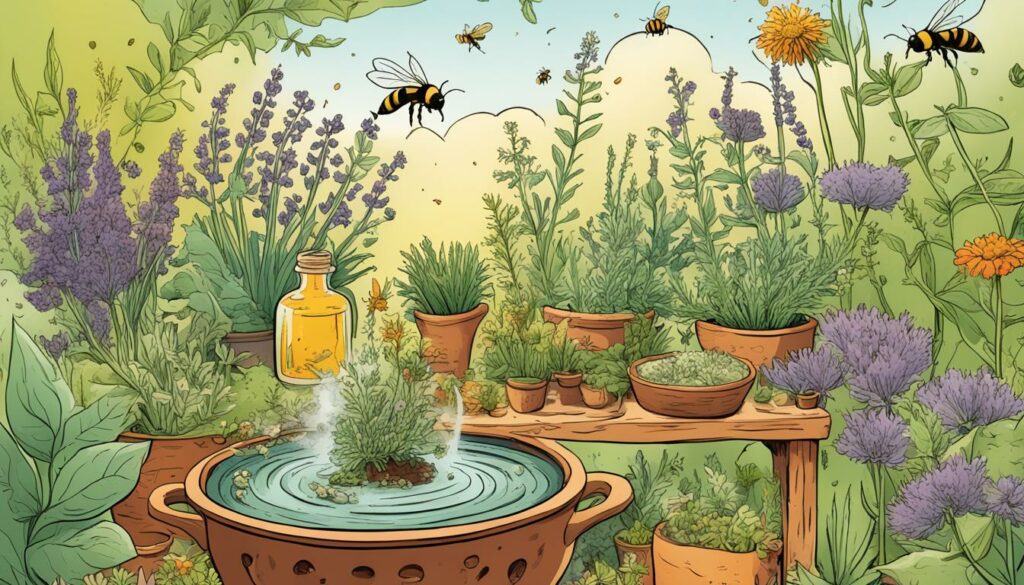
| Herbal Tradition | Key Features |
|---|---|
| Indigenous Traditional Medicine | – Deep connection to the land and cultural heritage – Holistic approach to health and well-being – Emphasis on restoring balance and harmony |
| African Herbalism | – Utilization of diverse medicinal plants – Spiritual aspects of healing – Community and ancestral wisdom |
| Ayurveda | – Balancing mind, body, and spirit – Personalized treatments based on constitution – Emphasis on herbs, diet, and lifestyle |
| Traditional Chinese Medicine | – Recognition of vital energy (qi) – Focus on harmonious balance – Incorporation of herbs, acupuncture, and more |
| Western Herbal Medicine | – Bridging traditional wisdom and scientific research – Using evidence-based approaches – Supporting natural healing processes |
Sourcing and Preparation of Herbs
When it comes to purchasing herbs, there are several factors to consider in order to ensure their quality, potency, and ethical sourcing. It’s important to know the origin of the herbs to ensure transparency and maintain quality control. Ideally, herbs should be sourced from their traditional environment, as they tend to grow best in their natural habitat.
The method of preparation plays a crucial role in unlocking the full potential of herbs. Depending on the intended use and desired shelf life, different herbal preparations can be employed. Infusions, tinctures, teas, powders, capsules, and balms are just a few examples of how herbs can be prepared for consumption or external use.
Another aspect to consider is whether to use fresh or dried herbs. Both options have their own advantages. Fresh herbs offer vibrant flavors and are perfect for immediate use, while dried herbs have a longer shelf life and are more convenient for storage.
It is equally important to prioritize ethical and sustainable practices when sourcing herbs. By doing so, we not only preserve the potency of the herbs but also protect the environment and support local communities. Choosing herbs that are ethically and sustainably sourced ensures that we engage in responsible consumption and contribute to the well-being of both ourselves and the planet.
FAQ
What are the benefits of herbalism?
How can herbs be used for home remedies?
Can herbs be used in beauty products?
How can herbs be incorporated into cooking and baking?
How can herbs be used for wellness?
What are some herbal traditions?
How should herbs be sourced and prepared?
Source Links
- https://www.rogersgardens.com/blogs/current-news-events/living-naturally-a-guide-to-the-benefits-of-herbalism-and-sustainable-living
- https://www.healthline.com/health/herbal-medicine-101-harness-the-power-of-healing-herbs
- https://www.betterhealth.vic.gov.au/health/healthyliving/herbs

